terrorist
Latest
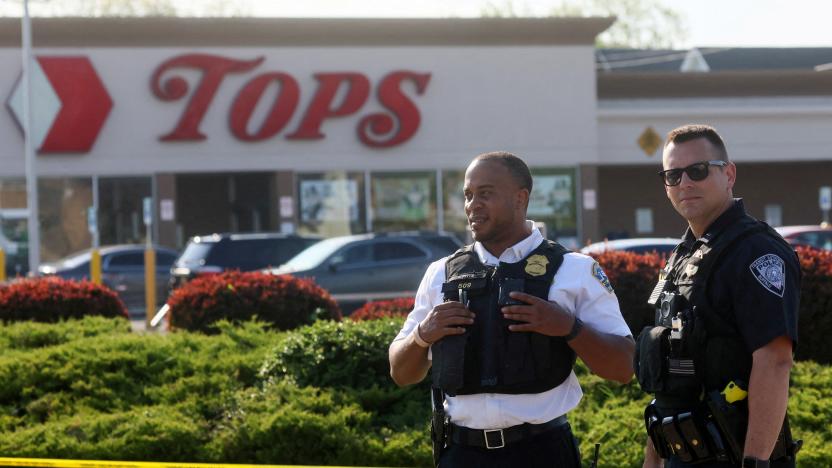
Buffalo gunman clips proliferate on social media following Twitch removal
Following Saturday’s horrific mass shooting in Buffalo, online platforms like Facebook, TikTok and Twitter are struggling to prevent various versions of the gunman’s livestream from proliferating on their platforms.
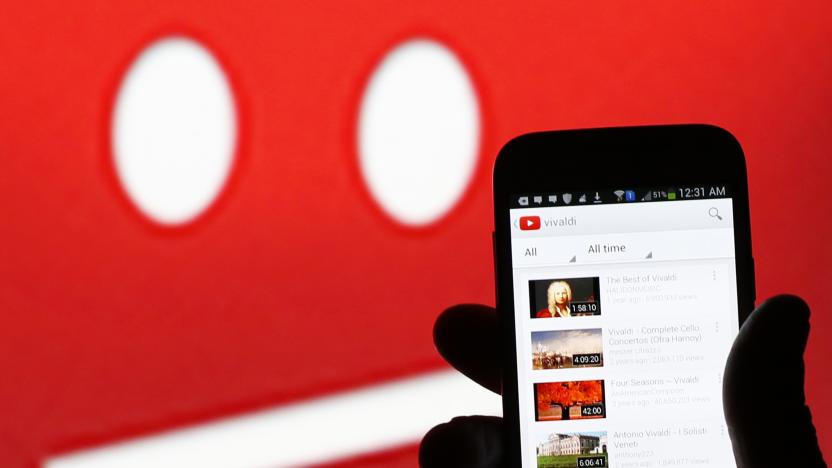
Google reportedly sent identifying info of extremist users to law enforcement
Google may have shared identifying information of certain users with law enforcement, according to a report from The Guardian.

Facebook will train its content-removal AI with police camera footage
Facebook will use footage from police body cameras to train its automatic detection systems to spot and remove footage of mass shootings. The company announced Tuesday that it will partner with law enforcement in the US and UK to obtain footage from their firearms training programs. Data from those videos should help Facebook's systems detect real-world, first-person footage of violent events.
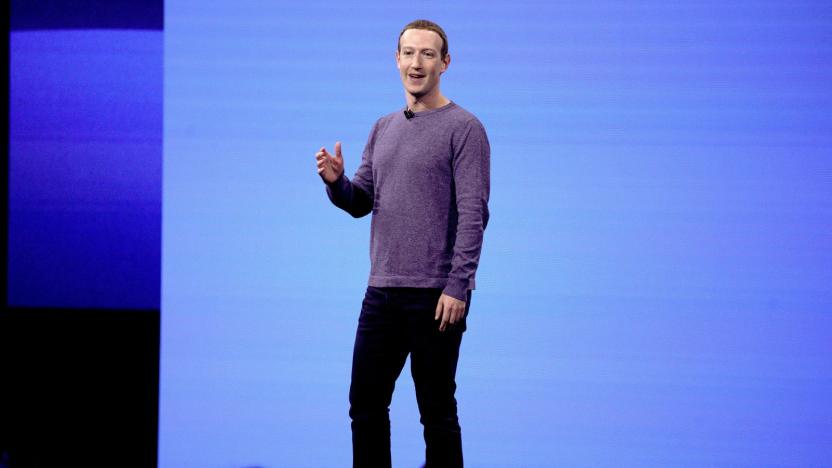
Facebook releases tools to flag harmful content on GitHub
Facebook wants to rid the internet of garbage. But it can't do that alone. So today, it's making two of its photo- and video-flagging technologies open-source and available on GitHub. It hopes the algorithms will help others find and remove harmful content -- like child exploitation, terrorist propaganda and graphic violence.

Facebook, Google and others join Christchurch Call to curb extremism
In the two months since the Christchurch attack in New Zealand, social media companies have struggled to remove videos of the violence from their platforms. And they've grappled with the role they may unintentionally play in the spread of terrorism. Today, Facebook, Microsoft, Twitter, Google, YouTube and Amazon signed their support to the Christchurch Call, which aims to address terrorist and violent content online. The companies join several countries -- though the US has not pledged support -- and are committed to a nine-point plan that outlines next steps.

After Christchurch, we need more than digital-security theater
Just after the Christchurch shooting I came across an article explaining how to make your Twitter, Facebook and YouTube accounts block violent videos. How-tos like this are depressingly necessary, because while Facebook removes an illustrated nipple for "community safety" at lightning speed with real consequences, the company isn't equally interested in policing content that's indisputably harmful. After the Christchurch attack, Facebook said it took down 1.5 million postings of the terrorist's mass-murder livestream within 24 hours, but only 1.2 million of those videos were blocked at upload.
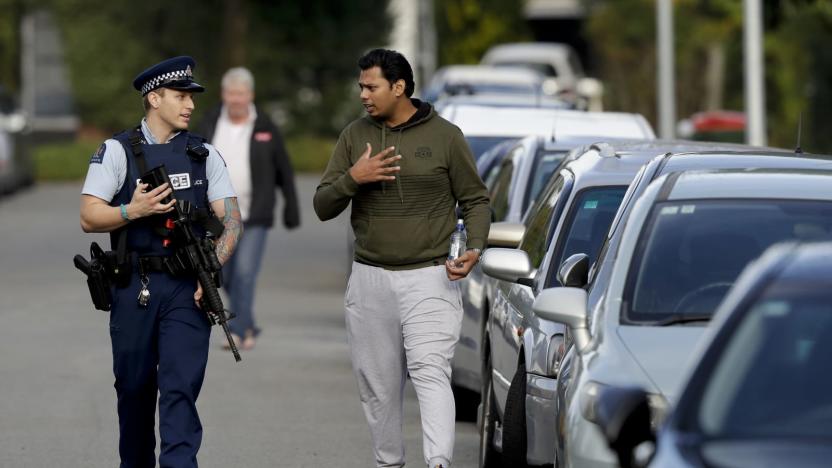
Facebook pulled over 1.5 million videos of New Zealand shooting
Internet giants have been racing to pull copies of the New Zealand mass shooter's video from their sites, and Facebook is illustrating just how difficult that task has been. Facebook New Zealand's Mia Garlick has revealed that the social network removed 1.5 million attack videos worldwide in the first 24 hours, 1.2 million of which were stopped at the upload stage. This includes versions edited to remove the graphic footage of the shootings, Garlick said, as the company wants to both respect people affected by the murders and the "concerns of local authorities."

Facebook and YouTube rush to remove New Zealand shooting footage
Facebook and YouTube are working to remove "violent footage" of the New Zealand mass shootings. The gunman -- who killed 49 people and injured 20 in shootings at two mosques in the city of Christchurch -- appeared to livestream his attack to Facebook using a head-mounted GoPro camera. New Zealand Police said they were moving to have the "extremely distressing footage" removed.
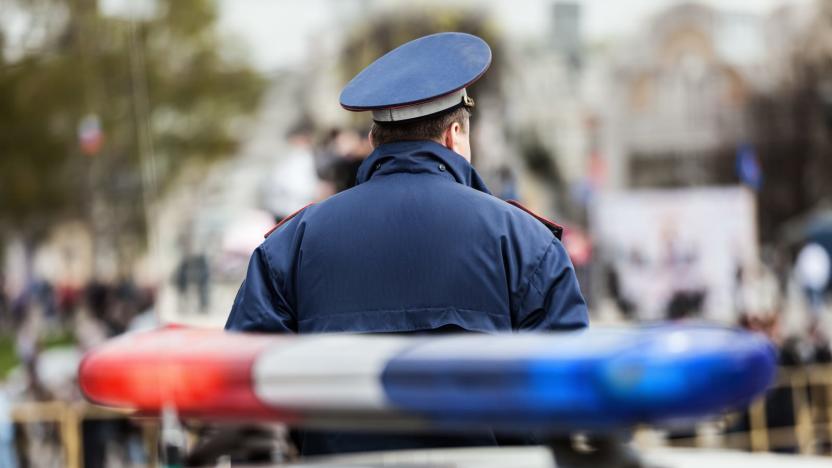
Terror threat posted on Whisper leads to arrest
A man from North Carolina was arrested by federal authorities shortly after he submitted a post that sounded like a threat to the anonymous secret-sharing app Whisper. According to the feds' affidavit, Garrett Grimsley from Cary posted the words "Salam, some of you are alright, don't go to Cary tomorrow" written on a photo of a bearded man carrying a red flag with a black star in the center. Another user who asked for a clarification through private message contacted authorities after receiving his response:

The FBI wants to crack another iPhone after Minnesota stabbings
The FBI and Apple might be headed for another fight over the case of a locked phone. Last night, FBI special agent Rich Thorton confirmed that the agency is trying to crack an iPhone belonging to Dahir Adan, a 20-year-old Somali immigrant who stabbed 10 people in a Minnesota mall last month. Per Wired, Thorton said the bureau was already sifting through some "780 gigabytes of data from multiple computers and other electronic devices," but unlocking Adan's phone could shed valuable light on why he did what he did and help figure out who (if anyone) helped him on his path.

ISIS' online presence reportedly includes a 24-hour 'help desk'
The terrorist group known as ISIS has ramped up its online outreach efforts in a big way over the past year, including establishing a 24-hour help desk that teaches members how to use encryption and other secure communications tactics, NBC News reports. News of the help desk comes from Dr. Aaron Brantly, a cyber fellow at the Combating Terrorism Center with the US Military Academy at West Point. According to Brantly, ISIS has "developed a series of different platforms in which they can train one another on digital security to avoid intelligence and law enforcement agencies for the explicit purpose of recruitment, propaganda and operational planning."

AOptix e-Gate could improve global airport security, replace ID checks with iris scans
You're certainly not alone if you think that the current airport security process is far from ideal. AOptix hopes to streamline and speed up security procedures by replacing manual boarding pass and ID checks with a biometric kiosk called e-Gate. The new system, which verifies passenger identities by matching an iris scan with a boarding pass, just received (IATA) approval, and is currently being tested in three airports around the world. It's not as slick as a similar concept we saw earlier this summer, but e-Gate could be implemented with a trusted traveler program, creating special lanes for pre-approved frequent fliers -- similar to the US Customs Global Entry system in place today. We don't see it replacing X-ray machines and check-in interviews, but it could remove human error from the equation -- at least when it comes to verifying your identity. Jump past the break for the full scoop from AOptix, or you can check out the system for yourself at the Future Travel Experience in Vancouver. Update: e-Gate is in fact a potential component of Checkpoint of the Future, which we saw conceptualized in June.%Gallery-133007%

IATA's Checkpoint of the Future uses biometric IDs to separate do-gooders from terrorists (video)
This, ladies and gentlemen, could be your Checkpoint of the Future -- a new airport security prototype that promises to move away "from a system that looks for bad objects, to one that can find bad people." Unveiled at the IATA's annual conference in Singapore yesterday, the setup is comprised of three, 20-foot long detectors -- one for "known travelers," one for high-risk flyers, and one for everyone else. Instead of funneling passengers through the same checkpoint, then, the prototype would use eye scanners and biometric chips to verify their identities and analyze their personal history, before dividing them into groups. People who complete and pass government background checks would waltz through the fast pass lane with their carry-on luggage in tow, whereas those deemed particularly risky would have to undergo a more intensive, full-body scan within the "Enhanced" security lane. The rest of us, meanwhile, would be directed to the "Normal" detector, which would automatically scan us for liquids, metals and everything that is evil. The IATA says this risk-based approach would reduce security lines and lower airport costs, but it would still require governments to share data on their own citizens, which could pose a major hurdle to widespread adoption. For now, the IATA and governmental agencies are still hammering away at the details and have yet to announce a pilot program, but you can check out an audio-less demo video of the prototype, after the break.

Metaphor recognition software aims to distinguish friend from foe
While it's only right that people be protected from bad poetry, this could be taking things a tad too far. Intelligence officials at the Office of Incisive Analysis (no, really) have determined that metaphors could be of vital significance to national security. By, well, incisively analyzing the way people use metaphors in everyday conversations, they believe they can reveal "underlying beliefs and world views" -- such as negative feelings towards a particular country. Now they're calling on civilian scientists and academics to help them do this automatically using pattern recognition and supercomputers. Of course there's always the risk that smart terrorists will switch to using similes instead.

Google and NORAD's Santa tracker is another victory for terrorists
Google and NORAD should rethink their annual Santa tracking service. Do we really want the evil doers to know the exact whereabouts of Mr. Claus on Google Maps and Earth from any PC or smartphone? A man so old that he's ineligible for a driver's license in some states yet pilots a 353,000-ton missile around the globe at a rate of about 650 miles per second? For shame.

NY teen arrested after leaving threatening note on screen in Apple Store
A teen in New York has been arrested for leaving a threatening note on the screen of a computer at an Apple Store. The 17-year-old boy was joking around with friends when he typed a note on screen promising "a bloody death" to anyone working in the store via a "bomb loaded with C4, strapped to my chest." The note was then signed with the name of one of his friends' fathers. He claims he typed it just to be funny, and then forgot to delete it when he left, but the District Attorney in Staten Island says it's no joke -- the kid faces up to seven years in prison. I can't help but think they'll let him off the hook eventually. Sure, it was a stupid (really stupid) thing to do, and they should come up with a punishment that teaches the kid a lesson, but time in prison labeled as a terrorist seems a little much for showing off to friends in an Apple Store. Maybe they can have him do some in-store lip synching performances as a community service. [via Cult of Mac]

Wii balance board could be used in fruitless airport security effort
You know that sweeping feeling of guilt that comes over you every time you're pulled over as part of a "standard traffic stop?" Yeah, those natural emotions are about to make you look incredibly suspicious on the way to your next flight -- or it will if the FAST project is ever turned into reality. The Homeland Security-funded Future Attribute Screening Technology effort, which has already ate away at $20 million in taxpayer dollars, essentially hopes to let flyers keep all of their clothes on while forcing them to stand on a Wii balance board (or similar) and have an array of sensors watch their every reaction to a battery of questions. The problem? Every innocent person on the planet's going to start sweating and shaking just being in that kind of scenario, and only the trained terrorists of the world are apt to be able to put truth aside and fake the machine into thinking everything is cool. Oh sure, we're being a little dramatic here, but seriously -- maybe the TSA should just require a complete life history as a prerequisite to boarding.[Via Popular Science]

India cracks down on open WiFi to stem terrorism, chain letters
Just when you thought you were doing your buddy next door a favor, turns out leaving your WiFi router open to the public is the first step in staging a terrorist bombing -- who knew? The Telecom Regulatory Authority of India (TRAI) reckons the country just isn't ready for that kind of responsibility, seeing as how email over WiFi is all the rage for transmitting instructions to fellow terror-ees these days. The aim is now to limit WiFi net access to authorized persons only. Man, just imagine what they'll do with WiMAX. In other news, the pencil sitting next to you could be used to poke your eye out if you're not careful.[Via The Economic Times]

Sri Lanka to ban phone sharing in order to thwart terrorist activities
We've seen countries institute some pretty weird regulations when it comes to wireless handsets, but this one is apt to seem patently absurd to anyone outside of (and possibly within) Sri Lanka. Government officials are reportedly gearing up to implement legislation that would require handset owners to "to carry a certificate of ownership at all times when carrying their phone around." The new law will hopefully cut down on some terrorist activities that have apparently been going on, but it will also inconvenience quite a few innocent citizens as well. Ah well, at least locals can legitimately ask their mooching friends to get their own without sounding all snobbish.[Via textually]

US troops to receive handheld lie detectors
In a move sure to bring the polygraph haters out of the woodwork, the US Army is issuing a handheld lie detector to select soldiers in Afghanistan in order to "root out potential terrorists" and help "narrow the list of suspects after a roadside bombing." The DoD isn't asserting that the device is perfect, but it's hoping the detection capabilities are accurate enough to save American lives and sniff out allegiances that may have otherwise gone unnoticed. Hailed as PCASS (Preliminary Credibility Assessment Screening System), the underlying unit is a TDS Ranger that relies on three sensors connected to a respondent and integrated software that uses Green to signify truth, Yellow if it can't decide and Red if it recognizes a filthy liar on the other end. Nevertheless, we're certain Lafayette Instrument Company is stoked about the deal -- you know, considering that the Army has already purchased 94 of 'em at $7,500 apiece.[Thanks, ladderless]












